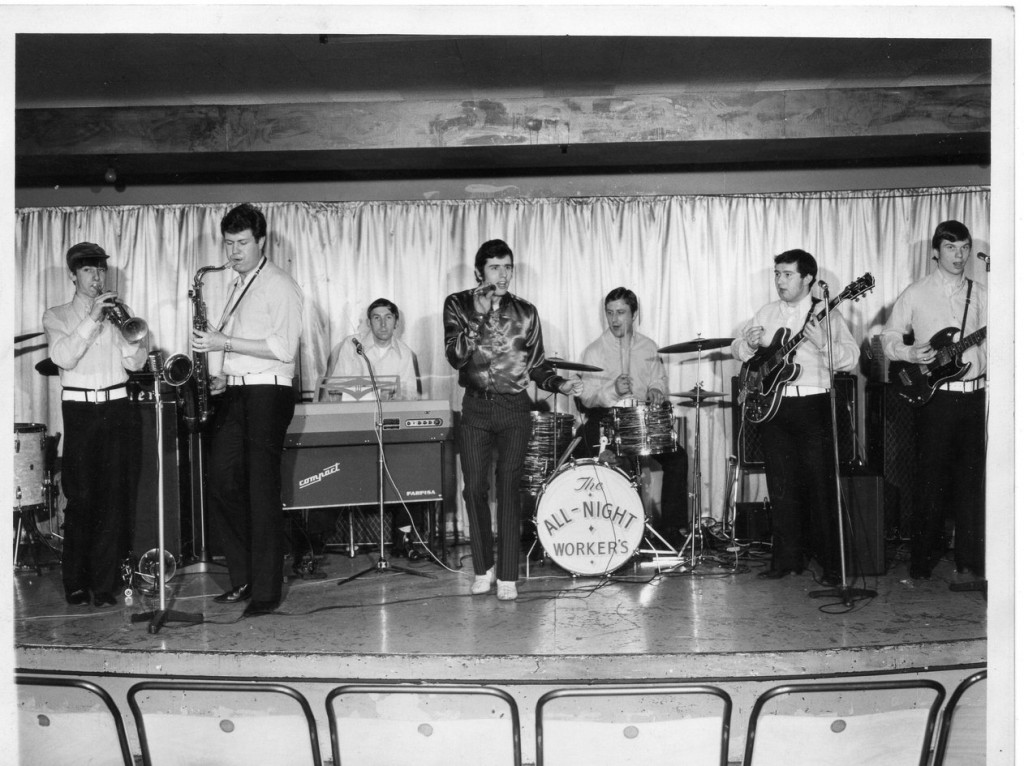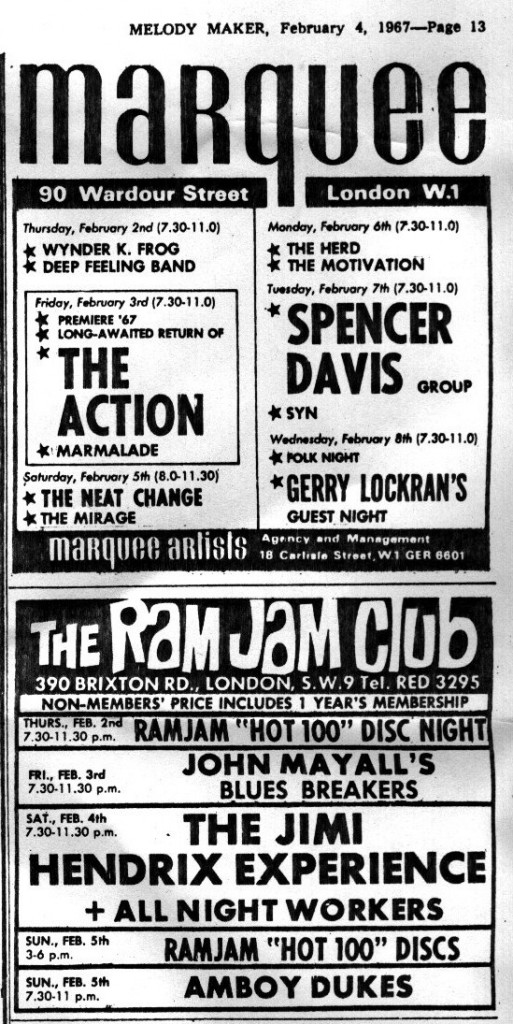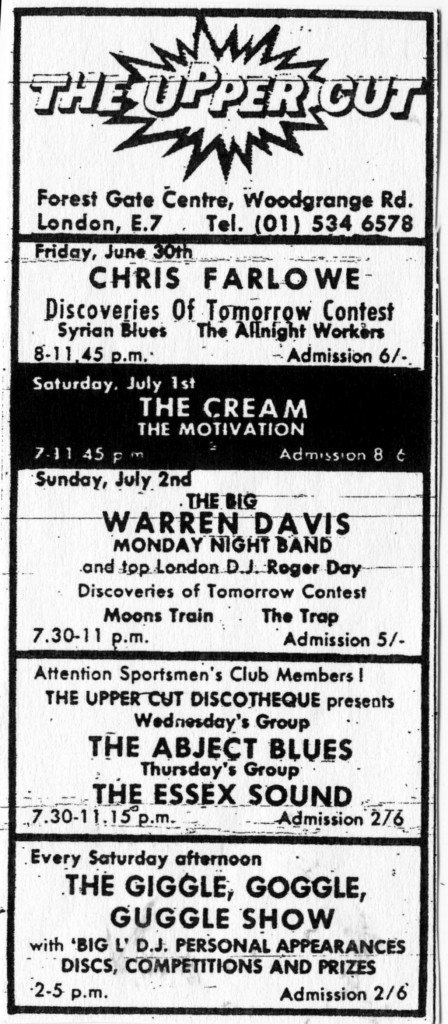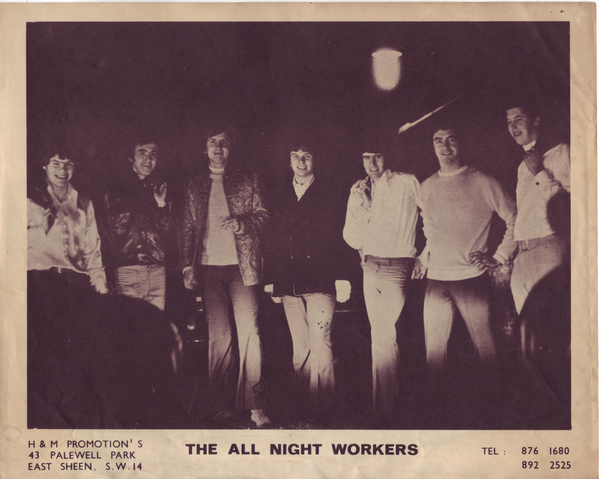By Nick Warburton
The All Night Workers/The All-Nite Workers was a name used by around 30 musicians from West London for a series of interrelated bands that spanned the years 1965-1972.
In the third part of an exhaustive history, Nick Warburton turns to the first version of The All Night Workers, a group formed by singer Mick Wheeler after he’d left Mike Dee & The Prophets and the rest of his former band had become The All-Nite Workers.
The All Night Workers at Starlite, Greenford, 1966. Left to right: Ronny Butterworth, Kenny Power, Dave Holloway, Mick Wheeler, Hans Herbert, Brian Sell and Doug Ayris (photo from Mick Wheeler)The All Night Workers #1 (Circa May-circa August 1966)
- Mick Wheeler – lead vocals
- Brian Sell – lead guitar
- Brian Hosking – bass
- Ken Hope – drums (replaced briefly by Terry Mabey)
Having left Mike Dee & The Prophets in spring 1965 (see part 1), Mick Wheeler formed his own version of The All Night Workers (spelt differently to The All-Nite Workers) with another former Prophet, Ken Hope around May/June 1966.
Childhood friend Brian Sell from the original Mike Dee & The Jaywalkers (see part 1) joined on lead guitar, having played and recorded with Rey Anton & The Peppermint Men in the interim and Brian Hosking, another Twickenham friend, completed the line up on bass.
The brother of sax player Mel Wayne from Mike Dee & The Prophets, Brian Hosking had started out with school band, The Diplomats. From there, he moved on to The Feeet with guitarist Doug Ayris. In 1963, the pair had formed The Legend with singer Nigel Kingswell and drummer John Sergeant.
While with this band, Hosking also started playing with The Smokestacks and ended up joining them in 1964, handing over the bass position to Roy Doughty. While The All Night Workers were starting up, Hosking opened the Heston Bar in Heston, Middlesex with his girlfriend.
The original line up, however, proved to be very short-lived. Ken Hope only did a few rehearsals before departing early on and, according to Brian Sell, Terry Mabey from Jimmy Royal & The Hawks/The Jimmy Royal Set filled in briefly.
Brian Hosking also dropped out at this stage after deciding to concentrate on running his bar full-time. Before leaving he introduced his former band mate, Doug Ayris, lead guitarist with The Legend, who took over the bass. Hosking would reunite with Ayris and Wheeler in October 1967 in a band called Deep Purple (see later entry).
The changes did not end there, however, as the band took on a horn section and an organist. Brian Sell brought in his friend Dave Holloway from Staines, Middlesex to play keyboards. At the same time, Ealing musician Hans “Herbie” Herbert came in on drums and invited his friend Kenny Power from his former band, The Flexmen, to join on sax.
The All Night Workers also added trumpet player Ron Terry, who worked at a tailors’ shop on the Fulham Road and was much older than the rest of the group. When Terry left around November 1966, Ronny Butterworth, a Feltham, Middlesex-based musician, who’d attended Debrome school with Jo Jo Gunne trombonist/trumpet player Alan Townsend and future All Night Workers sax player Johnny Baker, took over.
The All Night Workers #2 (Circa August 1966-March 1967)
- Mick Wheeler – lead vocals
- Brian Sell – lead guitar
- Dave Holloway – organ
- Doug Ayris – bass
- Ron Terry (replaced by Ronny Butterworth) – trumpet
- Kenny Power – sax
- Hans “Herbie” Herbert – drums
Hans Herbert’s mother took over the band’s management and secured bookings with top draws like The Jimi Hendrix Experience. The All Night Workers gigged widely, appearing at top London clubs like the Bag O’Nails, Tiles, the Ram Jam Club, the Flamingo and the Starlite Ballroom in Greenford, Middlesex.
Hans Herbert left to join Geno Washington and The Ram Jam Band in the spring of 1967 and was replaced by Dave Holloway’s friend Jim Park from Staines, Middlesex. Herbert, however, would briefly return to drum stool in The All Night Workers in early 1970.
Notable gigs:
- 5 November 1966 – Tiles, London (billed as All Nite Walkers [sic] so may be another band)
- 2 December 1967 – Starlite Ballroom, Greenford with Sands
- 17 December 1966 – Tiles, London with Embers West and Nite People (billed as All Nite Walkers [sic] so may be another band)
- 13 January 1967 – California Ballroom, Dunstable with Herbie Goins & The Night Timers and The Satin Dolls
- 4 February 1967 – Ram Jam, Brixton with The Jimi Hendrix Experience
- 4 February 1967 – Flamingo, Soho with The Jimi Hendrix Experience
- 11 February 1967 – Tiles, London with The Hobbs Kin and Grand Union
- 17 February 1967 – Ram Jam Club, Brixton with Ronnie Jones & The Blue Jays
- 18 February 1967 – Flamingo, Soho with Jo Jo Gunne
The All Night Workers #3 (March-October 1967)
- Mick Wheeler – lead vocals
- Brian Sell – lead guitar
- Dave Holloway – organ
- Doug Ayris – bass
- Ronny Butterworth – trumpet
- Kenny Power – sax
- Jim Park – drums (replaced by John Sergeant for the last gigs)
With her son gone, Ms Herbert’s interest in the band dwindled over the summer/autumn months and The All Night Workers started to fragment.
Sometime in late summer, Jim Park departed and later went on to play with Twickenham band, The Kool in mid-1969, although he would re-join The All Night Workers around December of that year. John Sergeant, who’d played with Doug Ayris in The Legend, filled in for the remaining gigs.
On 15 July 1967, The All Night Workers opened for The Carl Douglas Set/Big Stampede (featuring former Mike Dee & The Prophets member Mel Wayne on sax) at the California Ballroom in Dunstable. Doug Ayris borrowed Brian Sell’s guitar and sat in with Douglas’s band and then later that evening played a second gig with the Jamaican singer’s group at the Cue Club in Paddington.
A few days after the California Ballroom gig with Amen Corner and Jo Jo Gunne on 29 September 1967, Mick Wheeler, Doug Ayris and John Sergeant left, reuniting with Brian Hosking from the 1966 line up in a new project called Deep Purple (see below) and the first incarnation of The All Night Workers split up.
Brian Sell abandoned a music career but did reform The Peppermint Men in the late 1970s/early 1980s. Ronny Butterworth joined local rivals, Jo Jo Gunne, which had been active since late 1965 but was reformed in September 1967. It’s not clear what happened to Kenny Power and Dave Holloway.
The All Night Workers support Chris Farlowe at The Uppercut, East London, 30 June 1967Notable gigs:
- 27 March 1967 – Ram Jam Club, Brixton
- 15 April 1967 – Ram Jam Club, Brixton with The Pretty Things
- 6 May 1967 – Ram Jam Club, Brixton with Julian Covey & The Machine
- 13 May 1967 – Ricky Tick, Windsor, Berkshire
- 25 May 1967 – Royalty Ballroom, Southgate, London with The Stalkers
- 2 June 1967 – California Ballroom, Dunstable with Diane Ferraz with The Checkmates and The Symbols
- 10 June 1967 – Flamingo, Soho with Bill Pinkey & The Original Drifters, The Sovereigns, Bobby Johnson & The Atoms and Toni Rocket (billed as All-Nite Walkers)
- 30 June 1967 – Upper Cut, Forest Gate with Chris Farlowe & The Thunderbirds and Syrian Blues
- 1 July 1967 – Ram Jam Club, Brixton
- 1 July 1967 – Tiles, London with Good Time Band and Roger Bloom’s Hammer
- 15 July 1967 – California Ballroom, Dunstable with The Carl Douglas Set
- 21 July 1967 – Starlite Ballroom, Greenford, Middlesex with Chris Ian Disc Show
- 3 August 1967 – Starlite Ballroom, Greenford, Middlesex with Chris Ian Disc Show
- 12 August 1967 – Flamingo, Soho with The Paper Tissue (billed as All-Nite Walkers)
- 22 August 1967 – Royal Ballroom, Southgate, London (billed as All Night Walkers)
- 28 August 1967 – Flamingo, Soho with PP Arnold & The Nice and Ed Morino (billed as The All-Nite Walkers)
- 16 September 1967 – Flamingo, Soho with Locomotive (billed as The All-Nite Walkers)
- 23 September 1967 – Tiles, London with The Strange Fruit and Roll Movement (billed as The All Night Walkers)
- 29 September 1967 – California Ballroom, Dunstable with Amen Corner and Jo Jo Gunne
- 29 September 1967 – Starlite Ballroom, Greenford, Middlesex
Deep Purple (October 1967-February 1968)
- Mick Wheeler – lead vocals, congas
- Doug Ayris – lead guitar
- Brian Hosking – bass
- Ken Carroll – organ
- John Sergeant – drums
Named after a pre-wartime song that Mick Wheeler’s mother used to sing in her husband’s band, the quartet formed Deep Purple a year before the more famous version took on the name. (Ed: Another Deep Purple played regularly in the East Anglia area at this time and on one occasion supported The Maze, who featured Rod Evans, lead singer in the original Deep Purple.) Wheeler’s version also included another Twickenham musician, organ player Ken Carroll.
The All Night Workers, summer ’68, left to right: Johnny Baker, Malcolm Randall, Iain Pitwell, Doug Ayris, Mick Wheeler, Brian Mansell and Geoff GloverWheeler remembers his version playing a few shows, but in February 1968 the band had split up. With Deep Purple done and dusted, Doug Ayris and Mick Wheeler joined a new version of The All Night Workers in February 1968, which had been formed in mid-October 1967 by Wheeler’s former band mate from Mike Dee & The Jaywalkers, Brian Mansell (see part 4). Ken Carroll joined Jo Jo Gunne, while Brian Hosking returned to running his Heston bar before joining The Kool in August 1968. Another West London band, The Kool had started out as Ealing group, Jeff Curtis & The Flames before changing name around July 1967.
With the first incarnation of The All Night Workers splitting in early October 1967, another Middlesex group, The Missing Links, which featured musicians that had previously worked with Mick Wheeler and Brian Sell, took over the name for a second version.
See Part 4 of Nick Warburton’s exhaustive history of The All Night Workers here.
Copyright © Nick Warburton, 2012. All Rights Reserved. No part of this article may be reproduced or transmitted in any form or by any means, without prior permission from the author.
To contact the author, email: Warchive@aol.com
Many people helped piece this remarkable family tree together. My personal thanks go to: Mick Wheeler, Brian Sell, Brian Mansell, Brian Hosking, Doug Ayris, Johnny Baker and John Sergeant. Most of the gigs were sourced from Melody Maker. The California Ballroom, Dunstable website, which is currently unavailable was also incredibly useful.
Comment:
Found an article on Hans Herbert and Kenny Power’s Ealing band, The Flexmen in the Youth Times section of the Middlesex County Times & West Middlesex Gazette from 4 July 1964.
The line up was Pete Ross (guitar); Pete Carney (bass); Ken Power (sax); Bob Sellers (sax) and Hans Herbert (drums). Pete Carney, like Herbert, also ended up in Geno Washington’s Ram Jam Band.
Nick Warburton




